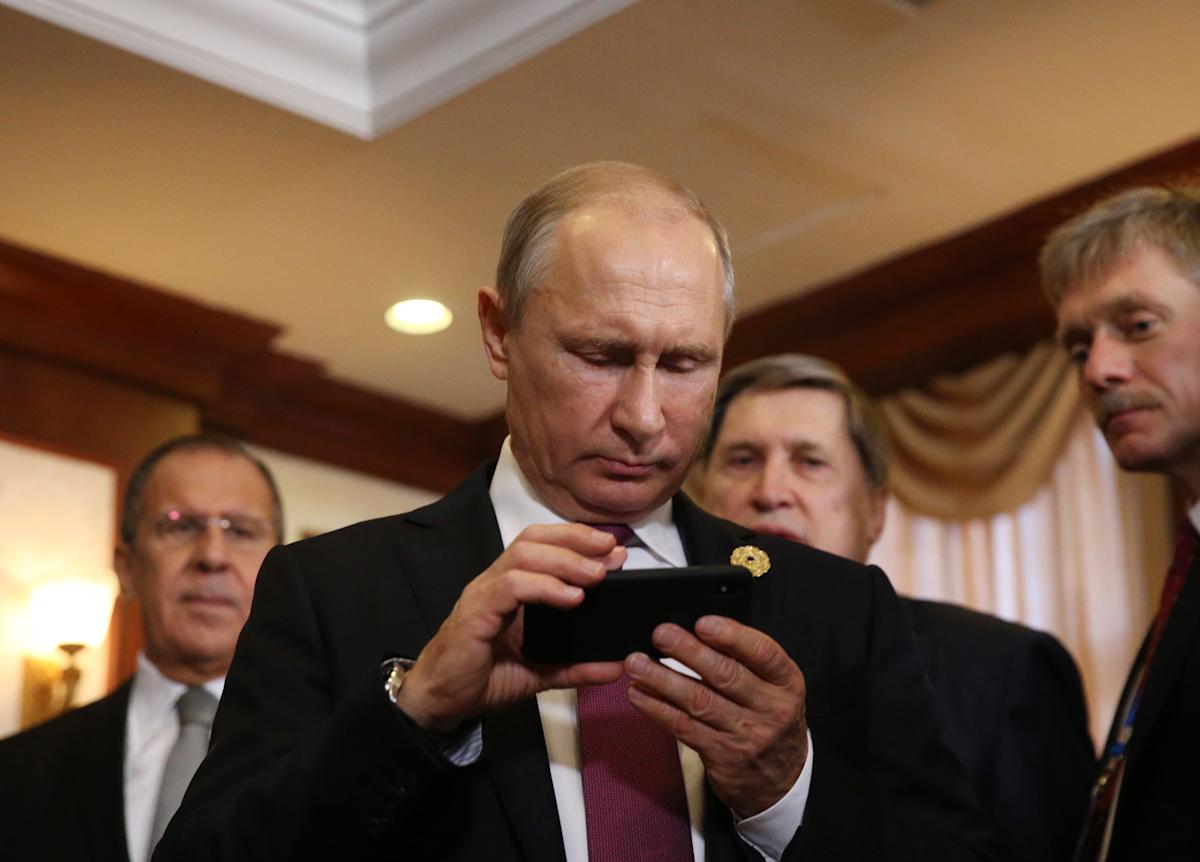Russian agents came to the home of Google’s top executive in Moscow to deliver a frightening ultimatum last September: take down an app that had drawn the ire of Russian President Vladimir Putin within 24 hours or be taken to prison.
Google quickly moved the woman to a hotel where she checked in under an assumed name and might be protected by the presence of other guests and hotel security, according to people with knowledge of the matter. The same agents – believed by company officials to be from Russia’s FSB, a successor to the KGB intelligence service – then showed up at her room to tell her the clock was still ticking.
Within hours, an app designed to help Russians register protest votes against Putin could no longer be downloaded from Google or Apple, whose main representative in Moscow faced a similarly harrowing sequence. Titans of American technology had been brought to their knees by some of the most primitive intimidation tactics in the Kremlin playbook.
The unnerving encounters, which have not previously been disclosed, were part of a broader campaign that Putin intensified last year to erode sources of internal opposition – moves now helping him maintain his hold on power amid a global backlash over the invasion of Ukraine.
In a single year, Putin had his political nemesis Alexei Navalny imprisoned after a poisoning attempt failed to kill him; pushed independent news outlets to the brink of extinction; orchestrated a Kremlin-controlled takeover of Russia’s Facebook equivalent; and issued “liquidation” orders against human rights organizations.
Amid this internal offensive, Putin also moved to bring foreign technology companies to heel. Moscow deployed new devices that let it degrade or even block Russians’ access to Facebook and Twitter, imposed fines totaling $120 million on firms accused of defying Kremlin censors, and ordered 13 of the world’s largest technology companies to keep employees in Russia and thus exposed to potential arrest or other punishment for their employers’ actions – a measure that U.S. executives refer to as the “hostage law.”
On their own, these moves were seen as disparate signs of Russia’ descent into authoritarianism. But they also laid the groundwork for the Soviet-style suppression of free expression now underway in Russia, much as the months-long military buildup set the stage for the invasion of Ukraine.
Putin’s crackdown has accelerated in recent weeks. Facebook and Twitter have been knocked offline by the government for millions of Russians. News outlets that survived state harassment for years shut down this month in the face of a new law imposing prison time of up to 15 years for spreading “fake” news – understood to be anything contradicting the Kremlin’s depiction of a “special military operation” unfolding with precision in Ukraine.
To Russian activists, the impact has been devastating.
“Every meaningful, practical avenue for dissent is being systematically shut down,” said Pavel Khodorkovsky, founder of the New York-based Institute for Modern Russia, whose father was one of Russia’s original oligarchs before spending a decade in prison after confronting Putin over corruption.
“I don’t think it’s an over dramatization to say that Putin is longing for a return to Soviet Union times,” Khodorkovsky said, “not only in geopolitical power but in terms of total control inside the state.”
There is preliminary evidence that the suppression strategy is working. Polls, whose reliability is always uncertain in Russia, show that a majority of Russians support the war. In interviews with Western journalists that have gone viral online, Russians who rely on state-controlled media have consistently echoed Kremlin falsehoods about eradicating alleged Nazism in Ukraine while seeming to be genuinely oblivious to the war’s carnage.
For relatives on opposite sides of the Ukraine border, reality has cleaved. Civilians in the besieged cities of Kyiv, Kharkiv and Odessa have described surreal conversations with family members in Russia who refuse to believe that Russian forces are bombing residential districts, that women and children are among the casualties, and that 2 million people have fled a country hit by power outages and food shortages.
The war is still in its early days. And it may prove more difficult for the Kremlin to sustain its information blockade as costs of the conflict, including mounting casualties and sanctions that are turning the country into an economically marooned pariah, penetrate Russian society.
Apple, Facebook, Twitter, YouTube and other platforms have played a major role in galvanizing the global response. Viral images of the devastation in Ukraine and video clips of the country’s resilient leader, Volodymyr Zelensky, have shaped world opinion and exposed Moscow’s war claims as fiction.
American technology companies have used their power to add to the pressure on Putin. Google’s YouTube platform has blocked RT, Sputnik and other Russian propaganda channels globally, and cut them off from ad revenue. Facebook, which Russia has sought to declare an “extremist” organization, has taken similar steps against state media outlets. Apple has “paused” sales of iPhones and other devices in Russia and removed RT and Sputnik from its app store outside the country.
But American tech companies have also made numerous compromises with the Kremlin in recent years that have undermined activist groups, impaired Russians’ access to reliable information and look increasingly problematic in the wake of the invasion.
– – –
Even after the threat to its executive, Google kept its employees in Russia and continued to negotiate with the Kremlin on ways to comply with the so-called landing law putting company officials there at risk of arrest or other punishment, according to industry executives familiar with the discussions. Those talks were still underway, one executive said, even after U.S. officials were warning that a Russian invasion of Ukraine was imminent.
Apple has similarly kept employees in Russia and taken other steps to placate the Kremlin. The company last year began configuring iPhones sold in Russia to promote Kremlin-backed social media companies, enabling users to activate them with a single click. It is an accommodation Apple has rarely made elsewhere and advances Putin’s goal of migrating Russian people to platforms controlled by the government, according to Russia analysts.
Among them is VKontakte, a Facebook equivalent that in December became majority owned by the state-run energy giant Gazprom.
Apple is also yet to give Russian users access to a new security tool, Private Relay, that could help Russians reach foreign news coverage and other content blocked by the government. The feature, designed to render Internet browsing untraceable, comes pre-installed on new phones in the United States and other markets. But those who try to activate it in Russia get a message saying that the program “is not supported” in that country.
Apple’s decision has baffled Russian analysts.
“What is the reason at this point to accommodate the Russian government?” asked Sergey Sanovich, a postdoctoral scholar at Princeton University tracking the Kremlin crackdown. “I’m not sure what [Apple] has in Russia that they are trying to protect at this point.”
Apple, through a spokesman, declined to answer questions from The Post or comment for this article. Google did not directly respond to questions, but referred The Post to a Web site where the company lists its responses to the Ukraine crisis.
For years, American technology companies navigated a narrow path in relations with the Kremlin. Google and others resisted some of the most invasive demands, including a law requiring the storing of users’ data on servers in Russia more likely to be breached by the government. But the firms granted concessions in other areas in part to preserve access to the Russian market.
“A lot of tech companies played rope-a-dope with the Russian government,” said Andrew Weiss, a former White House official who oversees research on Russia at the Carnegie Endowment for International Peace.
The war in Ukraine has scrambled those calculations, and, at least in some corridors of Silicon Valley, led to bouts of second-guessing.
“There is concern about the employees we have there,” said an executive with one of the companies that has been a target of pressure by the Kremlin. “There may come a point where [my] company decides it’s not worth it anymore and just completely pulls up stakes.” He and others spoke on the condition of anonymity, citing the situation’s sensitivity.
Even critics of U.S. tech companies acknowledge that departures on those terms could be harmful to U.S. interests and advantageous to Putin.
The devices and platforms provided by American tech firms have functioned as conduits of Western information and ideas to millions of Russians. This American technology has been critical to protest movements and reform advocates, enabling such groups to raise money, build support and map strategy on encrypted channels that are more difficult for Russian intelligence agencies to monitor.
– – –
A decade ago, Navalny’s group started with about 50,000 followers, but was reaching as many as 10 million a day before the war through videos and other messages distributed on YouTube, Twitter, Telegram and other platforms, according to Leonid Volkov, the political director for the organization.
That is in part why the decisions by Google and Apple to take down the Navalny app in September were seen as such betrayal, Volkov said. “It was a major blow to our supporters,” he said. “They really helped Putin.”
The Smart Voting app, as it was called, had sought to help Navalny supporters across the country select candidates with the best prospects of beating representatives of Putin’s United Russia party. The aim was not to take control of the Duma – considered an impossibility because of ballot manipulation – but to eat into United Russia’s margin of victory, bring new energy to the opposition movement and deliver an embarrassing setback to Putin, Volkov said.
The app had been conceived in part as a way to evade Kremlin censors; while Russian authorities were well equipped to take down lists posted online, the main censorship body, Roskomnadzor, had not demonstrated that it could interfere with downloads through Google and Apple’s secure app stores to millions of cellphones.
Navalny’s organization had spent months fine-tuning the app and selecting 1,300 candidates for endorsements. Then, at 8 a.m. on Sept. 17, just as the three-day voting period for the Duma election was to get underway, the app disappeared from Google and Apple platforms.
The removal of the app came after a period of escalating pressure. Weeks earlier, Roskomnadzor had ordered Apple, Google and other companies to sever all ties to Navalny, citing his group’s status as an “extremist” entity and warning that any link to the voting app would be construed as foreign election interference.
On Sept. 3, a Moscow court had ordered Google and Yandex, the main Russian search engine, to stop displaying Navalny-related results on their websites. A week later, U.S. Ambassador John Sullivan was summoned to the Kremlin. “There is one reason – interference in Russian elections,” said foreign ministry spokeswoman Maria Zakharova in a posting on the messaging service Telegram.
When Google and Apple resisted removing the app, the Kremlin’s tactics became more menacing. On Sept. 14, armed Russian police entered Google’s offices in Moscow, a frightening show of force staged under the pretext of collecting fines for alleged content and other violations.
The first sign of trouble for Navalny’s team came the next day when the organization made its first attempt to post a list of endorsed candidates to the Smart Voting app and “nothing happened,” Volkov said. At first, he said, it was unclear whether there was a technical problem or the companies were succumbing to pressure.
Even so, the app had remained available to download until the morning after Russian agents arrived at the Google and Apple representatives’ doorsteps. Google’s executive, a Russian citizen, was “essentially threatened with treason as a Russian citizen,” said an executive with knowledge of the episode.
Executives asked that her identity not be disclosed out of concern for her safety.
The group tried to get its endorsements out through other means, posting lists to the Google Docs platform and even reading the names of endorsed candidates on videos posted to YouTube. But that material was taken down as well under pressure from Roskomnadzor.
Volkov filed complaints with both companies, pleading with them to reinstate the group’s software. Google finally did so, but only days after the election – when distributing the list of endorsed candidates had become pointless.
Russia also tried to force Twitter to censor Navalny and others. But it did not have employees in the country to be threatened. Instead, the Russian government made a crude attempt to block Internet access to Twitter, inadvertently blocking other sites as well.
The removal of the app by Google and Apple was met with relative silence from Western governments, a muted reaction that stunned not only Navalny’s group but some company executives.
“When we took down the Navalny app, there was not a peep from any democratic element,” said an industry executive who had disagreed with the decision. “I was hoping we’d be beaten by [Secretary of State] Tony Blinken” or other U.S. or European Union officials, the executive said. “But no one did.”
Google executives disclosed the removal of the app in an internal email whose contrite tone suggests that the decision was not popular with some employees. “We resisted this position for as long as possible,” the message said, “but nothing is more important to Google than the safety and well-being of our employees.”
Apple responded to Navalny with a legalistic defense of its decision. The orders to take down the app “reflect the state of the law in Russia and Apple was obliged to act on the orders,” the letter said, according to a copy shared by Volkov.
It is hard to know what impact the companies’ capitulation had on the election. United Russia ended up losing about 20 seats in the Sept. 19 election, far short of the 60 or 70 that Volkov said his organization thought it was in position to gain before the decisions by Google and Apple.
– – –
The core of Navalny’s team fled Russia last year and now works from an office in Vilnius, Lithuania, several blocks from a museum where Soviet-era prison cells and torture chambers have been preserved in a building that served as a KGB headquarters.
In an interview before the Ukraine invasion, Volkov talked about the dire situation for dissidents and how it might take an unexpected shock to society – what he referred to as a “Black Swan” event – to dispel Russia’s political apathy and threaten Putin.
The invasion has seemingly delivered such a scenario, creating extraordinary upheaval. But Navalny’s organization is not in Russia to mobilize opposition, and its ability to do so through online means has been impaired by Putin’s campaign of suppression.
In recent weeks, however, Navalny has found new use for the app, posting appeals to Russians urging them to attend antiwar rallies, and sharing news about his trial on charges of embezzlement from his own organization – allegations that he adamantly denies and that U.S. officials consider politically driven.
Those messages now flow to users of cellphones powered by Google’s Android operating system, which accounts for about two-thirds of the Russian market.
But iPhone users in Russia can’t see them.
Volkov sent another letter to Apple on March 1, urging the company again to reconsider. “With independent media being banned in Russia, our team’s resources serve as the key source of objective information about the war,” the letter said, adding that because other platforms were blocked, “the most important media among our resources was the application.”
Apple responded that it was reviewing the matter, Volkov said, but as of Friday had yet to reinstate the Navalny application.
– – –
The Washington Post’s Gerrit De Vynck and Isabelle Khurshudyan contributed to this report.
Related Content
10 tournaments, 106 teams, 96 games: How March Madness became a staple in Sin City
Record gas prices are pushing up everyday costs, dampening economic recovery
Her body washed ashore in Connecticut. The search for her family began.




